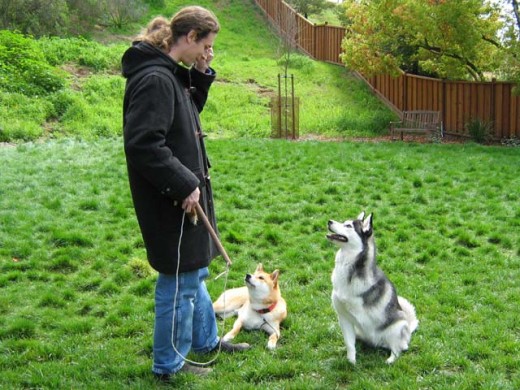Operant conditioning does not mean reward training.
Operant conditioning actually encapsulates both reward and aversive training. In its simplest form, operant conditioning says that to modify a dog’s behavior, we can either add or take away a reward stimulus (positive reinforcement, negative punishment); or we can add or take away an aversive stimulus (positive punishment, negative reinforcement).

Operant conditioning in itself is not pro-reward stimulus or aversive stimulus.
However, it is interesting to note that B.F. Skinner, who developed many of the operant conditioning principles, has expressed that reward stimulus is the preferable form of control.

Operant Conditioning Trainer
When someone says “operant conditioning” trainer, it actually refers to all dog trainers because every trainer uses some form of operant conditioning techniques to modify a dog’s behavior.
Cesar Millan (The Dog Whisperer) uses operant conditioning techniques, Victoria Stilwell uses operant conditioning techniques, Brad Pattison uses operant conditioning techniques, and so does other television and non-television dog trainers.
Included in the operant conditioning framework are studies on timing, frequency, and schedules of reinforcement.
For example, operant conditioning studies tell us that a variable schedule of reinforcement is more effective than a fixed schedule of reinforcement. I.e. rewarding our dogs intermittently for behaviors is more effective than rewarding our dogs every time, or every other time.
Similarly, if you over-correct a dog, he will quickly get habituated to your corrections, and may no longer respond to future corrections.
Operant conditioning is based on many years of study, by scientists and psychologists.
It provides us with a useful framework to not only modify or shape the behavior of dogs, but also that of all animals.
When someone says that reward training does not work, or that aversive training does not work, it goes against all the scientific evidence that we have.

Modify Animal Behavior
Both reward and aversive techniques can be used to modify animal behavior.
This includes getting your dog to perform good behaviors (e.g. Sit, Down) as well as stopping your dog from performing bad behaviors (dog rehabilitation).
Personally, I use reward techniques almost exclusively with my own dogs because it is less risky, and the effects of making training mistakes are less serious.
When looking for a dog trainer, make sure to find one that understands the basic principles of operant conditioning and classical conditioning.
These two processes underlie much of what goes into dog training, and someone who understands these behavioral psychology principles will be in a better position to understand, guide, and shape your dog’s behavior.
